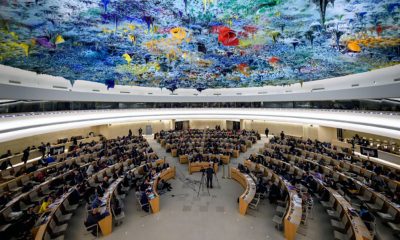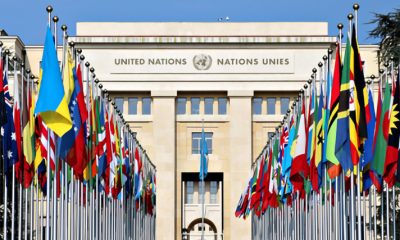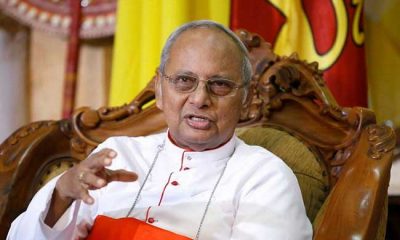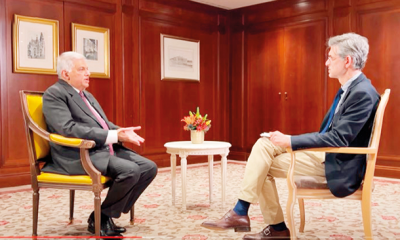News
UNHRC adopts Universal Periodic Review outcomes of Lanka, etc.
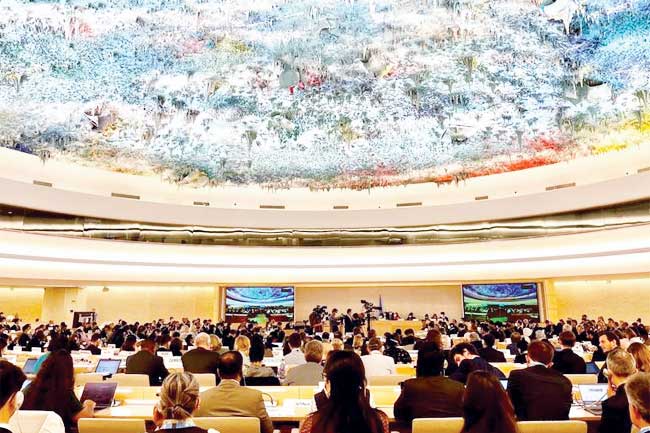
The Human Rights Council on Monday adopted the Universal Periodic Review outcomes of Pakistan, Japan and Sri Lanka.
With regard to Sri Lanka, the Vice-President of the Council said that out of the 294 recommendations received, 173 enjoyed the support of Sri Lanka, and 121 were noted.
Speaking in the discussion on the Universal Periodic Review outcome of Sri Lanka were Japan, Lao People’s Democratic Republic, Libya, Maldives, Morocco, Nepal, Nigeria, Oman, Pakistan, Philippines, Russian Federation, Singapore, South Africa and UN Women.
Also speaking were Lawyers for Lawyers, Franciscans International, Federatie van Nederlandse Verenigingen tot Integratie Van Homoseksualiteit – COC Nederland, World Evangelical Alliance, CIVICUS – World Alliance for Citizen Participation, Human Rights Watch, Christian Solidarity Worldwide, Humanists International, Stichting Global Human Rights Defence, and Amnesty International.
Consideration of Universal Periodic Review Outcome of Report
The Council has before it the report of Sri Lanka (A/HRC/53/16) and its addendum (A/HRC/53/16/Add.1).
Presentation of Report
Sri Lanka said the Government was taking significant steps to address national reconciliation issues, while at the same time making every effort to pursue economic reforms to mitigate the recent challenges faced by the country. All recommendations were carefully examined by the Government. Following this extensive process, Sri Lanka had decided to support 173 recommendations and take note of 115. There were a significant number of recommendations pertaining to the prevention of terrorism act, and the Government had undertaken to repeal the act as a voluntary pledge. Sri Lanka remained committed to pursuing efforts to achieve tangible progress in national reconciliation through domestic mechanisms with the assistance of international partners.
In guaranteeing fundamental freedoms, the Constitution of Sri Lanka provided permissible restrictions to ensure that the freedom of speech and expression, and of peaceful assembly and association were subject to such restrictions as may be prescribed by law in the interests of national security, as well as racial and religious harmony. Sri Lanka supported all recommendations received on trafficking in persons and committed to continue efforts towards combatting all forms of trafficking in persons, including of women and children. Measures were being taken to address violence against women through the adoption of a national policy on gender equality and women’s empowerment. Sri Lanka would continue to work towards implementing the recommendations that were supported by the Government.
Discussion
In the discussion, a number of speakers congratulated Sri Lanka for accepting 173 recommendations and for their efforts to promote and protect human rights in the country. Speakers hailed progress made on human rights thanks to the ratification of several international treaties. It was commendable that Sri Lanka had accepted recommendations related to poverty reduction and equal education. The country had also taken appropriate measures to ensure mental health services and to implement mental health awareness raising campaigns. Speakers hailed efforts undertaken by Sri Lanka to implement national plans to attain the Sustainable Development Goals. The country’s efforts in strengthening the social protection system and providing relief to those most affected by the COVID-19 pandemic were appreciated. The adoption of Sri Lanka’s first national action plan on women, peace and security was also commended.
Some speakers said that Sri Lanka should repeal all discriminatory legal provisions, including those in the Penal Code. There needed to be increased efforts to address gender discrimination. In Sri Lanka, lawyers were increasingly the subject of harassment and discrimination, particularly those working on sensitive cases such as minority rights. Sri Lanka was urged to implement all recommendations to protect human rights defenders and take all efforts to protect lawyers. The Government was also called on to discharge activists and protesters who were facing court cases due to arbitrary arrests, and to remove all legislation which targeted activists.
A number of speakers said the Office of Missing Persons, established in 2017, remained central to the Government’s intention to establish the fate of thousands of victims of enforced disappearance. However, it had failed to complete an investigation in even a single case, and had widely lost the confidence of victims’ families. Members of Tamil communities also continued to face harassment, intimidation and arrest for conducting events to memorialize victims of the conflict, or for staging protests demanding accountability for abuses.
The challenges faced by Sri Lanka due to the global crisis were recognized by some speakers, and it was important for the country to implement recommendations in a way that best suited their social standards. They supported the adoption of the report of Sri Lanka and wished the country every success in the implementation of all accepted recommendations.
The Vice-President of the Council said that out of the 294 recommendations received, 173 enjoyed the support of Sri Lanka, and 121 were noted.
Concluding Remarks
Sri Lanka said it was important to work towards the realisation of universal human rights based on genuine dialogue and cooperation, and devoid of politicisation, selectivity or discrimination. As the Minister of Foreign Affairs stated during the review in February, the government was keen to use this opportunity as a catalyst for the realistic assessment of challenges, to learn from the past and to build better and stronger in moving forward. Sri Lanka accepted that the primary responsibility for the promotion and protection of human rights and fundamental freedoms rested with the State concerned. States undertook this responsibility in accordance with their national policies, cultural norms and constitutional framework. Sri Lanka attached equal value to all human rights and was firmly of the view that the right to development was equally important. Sri Lanka had supported all recommendations received pertaining to human rights and the environment.
The Council then adopted the decision on the outcome of the Universal Periodic Review process of Sri Lanka.
Latest News
Advisory for severe lightning for the Western and Sabaragamuwa provinces and Galle and Matara districts
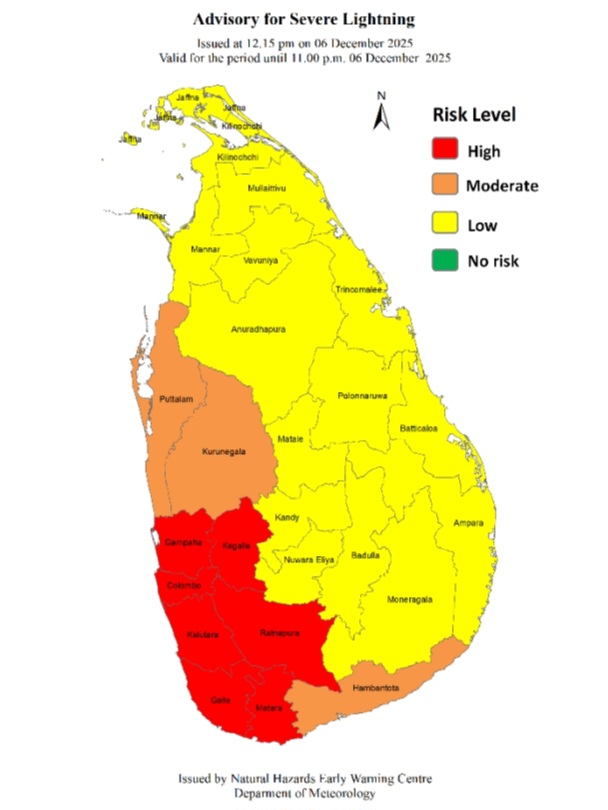
Advisory for Severe Lightning Issued by the Natural Hazards Early Warning Centre at 12.15 p.m. 06 December 2025 valid for the period until 11.00 p.m. 06 December 2025.
The public are being cautioned that thundershowers accompanied with severe lightning are likely to occur at some places in the Western and Sabaragamuwa provinces and in Galle and Matara districts.
There may be temporary localized strong winds during thundershowers.
The General public is kindly requested to take adequate precautions to minimize damages caused by lightning activity.
ACTION REQUIRED:
The Department of Meteorology advises that people should:
Seek shelter, preferably indoors and never under trees.
Avoid open areas such as paddy fields, tea plantations and open water bodies during thunderstorms.
Avoid using wired telephones and connected electric appliances during thunderstorms.
Avoid using open vehicles, such as bicycles, tractors and boats etc.
Beware of fallen trees and power lines.
For emergency assistance contact the local disaster management authorities.
News
Government briefs Diplomatic Community on recovery progress

A special briefing for the diplomatic community in Sri Lanka was held on 4 December at the Ministry of Foreign Affairs, Foreign Employment and Tourism, chaired by Prime Minister Dr. Harini Amarasuriya together with the Minister of Foreign Affairs, Foreign Employment and Tourism, Vijitha Herath. Senior government officials, including representatives of the Disaster Management Centre (DMC) and the Sri Lanka Tourism Development Authority (SLTDA), also participated.
Opening the session, Prime Minister Dr. Harini Amarasuriya expressed her gratitude to the diplomatic community for their immediate support and solidarity following the recent floods and landslides. She noted that Sri Lanka had endured one of the most severe disasters in recent years, but the resilience of the people and the coordinated efforts of government agencies had enabled a rapid response and significant progress in relief operations. She confirmed that not a single tourist has been reported harmed during the disaster and noted that the previously inaccessible areas are now reachable. Massive cleanup and decontamination operations are underway to ensure that lands and public spaces are safe for return, and communications have been restored in the affected areas.
The Prime Minister emphasized that relief, evacuation, and emergency assistance were carried out with the collective effort of the tri-forces, police, public officers, health workers, volunteers, and local authorities. She acknowledged the continuing challenges, including the restoration of infrastructure, resettlement needs, and long-term disaster-mitigation work, and welcomed the technical, humanitarian, and financial support offered by partner countries.
Maj. Gen. Sampath Kotuwegoda (Retd), Director General of the Disaster Management Centre, delivered a detailed presentation on the current status of the disaster, including the number of affected families, evacuation centres, damage assessments, and the ongoing coordination with international agencies for recovery planning. The cyclone affected almost the entire country, with 22 districts severely impacted. Some locations recorded up to 540 mm of rainfall and winds of up to 70 km/h, causing widespread infrastructure damage. Early assessments indicate that 2.3 million people were exposed to flooding, with 1.8 million people directly affected on the ground and 1.1 million hectares of land impacted. The assessment also identified 40,152 pregnant women among those affected, who have been prioritized for support. He also highlighted areas where further technical cooperation, such as early-warning systems, mapping capabilities, and climate-response technologies would be valuable.
Buddhika Hewawasam, Chairman of the Sri Lanka Tourism Development Authority, briefed the diplomatic community on the impact of the disaster on the tourism sector. He reassured attendees that major tourism zones remain operational, safety assessments are underway, and contingency measures have been activated to support visitors and protect the industry during the upcoming peak season. The Chairman of the Hotel Association of Sri Lanka Ashoka Hettigoda confirmed that the Coastal and resort hotels from Maravila to Passikudah are operating, with many reporting 60–65 percent occupancy; the hotels in Nuwara Eliya are partially operational. He made an appeal that the best assistance that the international community can give to Sri Lanka is the continued support provided through tourism.
Several diplomats conveyed their condolences to affected communities and reaffirmed their governments’ readiness to assist Sri Lanka in both immediate relief efforts and long-term rebuilding. They expressed appreciation for the government’s transparent engagement and the coordinated approach to managing the crisis.
Prime Minister thanked the diplomats for their continued cooperation and underscored the government’s commitment to ensuring an effective and inclusive recovery. She stressed that strengthening disaster preparedness, climate resilience, and institutional capacity will be central to Sri Lanka’s national development agenda moving forward. Deputy Minister of Foreign Affairs, Foreign Employment and Tourism, Arun Hemachandra, Secretary to the Prime Minister, Pradeep Saputhanthri, and Secretary to the Ministry of Foreign Affairs, Ms. Aruni Ranaraja, also attended the meeting.

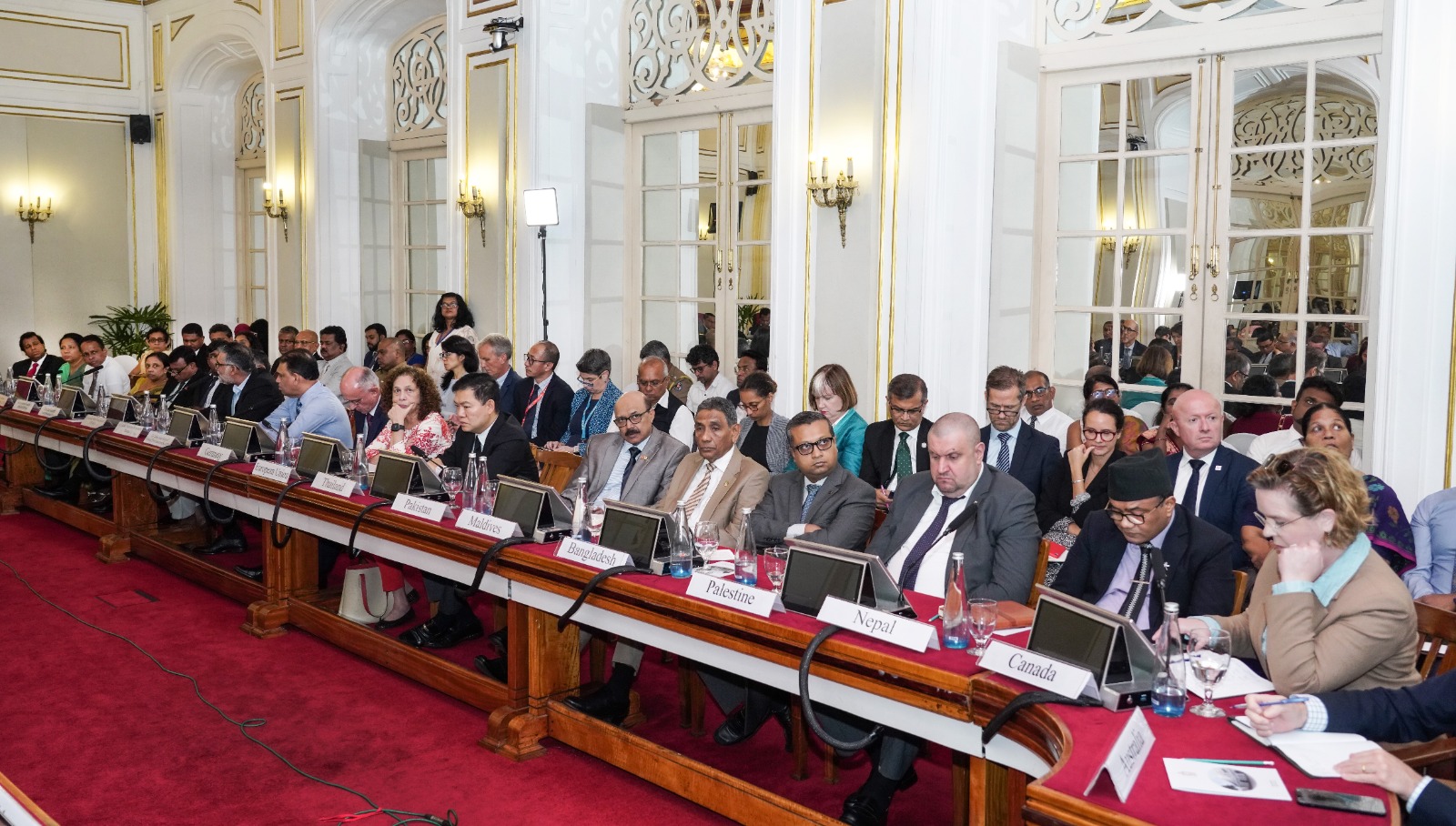
[Prime Minister’s Media Division]
News
All parties have agreed to recruit Development Officers into the teaching service through a competitive examination – PM

Addressing Parliament on Friday (05), the Prime Minister stated that, in accordance with the Supreme Court decision, the recommendations issued by the Public Service Commission, and the Sri Lanka Teachers’ Service Minute, all parties have agreed to recruit teachers through a competitive examination. The Prime Minister further noted that during the second phase of the recruitment process, the Development Officers currently serving in schools will be given preference during the interviews.
Addressing further, the Prime Minister stated,
“In compliance with the final order of the Supreme Court and the provisions of the Sri Lanka Teachers’ Service Minute, the Development Officers will be given the opportunity to join the Sri Lanka Teachers’ Service.
It has been decided to revise the maximum age limit of 40 years, as specified in the examination notification for applicants, to 45 years for this instance only”.
The Prime Minister further stated that, in accordance with the Supreme Court decision, arrangements have been taken to revise the age limits for graduates employed in the public service and graduates not employed in the public service, and to conduct separate examinations accordingly, in order to recruit teachers to Grade 3. i (a) of the Teachers’ Service to fill the available vacancies.
[Prime Minister’s Media Division]
-
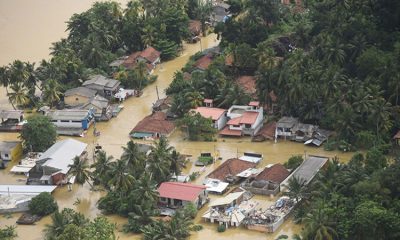
 News7 days ago
News7 days agoWeather disasters: Sri Lanka flooded by policy blunders, weak enforcement and environmental crime – Climate Expert
-
News4 days ago
Lunuwila tragedy not caused by those videoing Bell 212: SLAF
-

 News3 days ago
News3 days agoLevel III landslide early warning continue to be in force in the districts of Kandy, Kegalle, Kurunegala and Matale
-

 Latest News5 days ago
Latest News5 days agoLevel III landslide early warnings issued to the districts of Badulla, Kandy, Kegalle, Kurunegala, Matale and Nuwara-Eliya
-
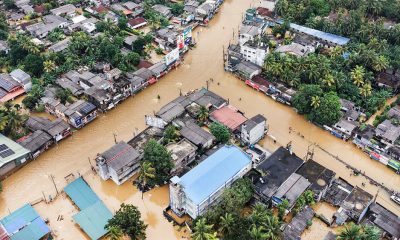
 Features5 days ago
Features5 days agoDitwah: An unusual cyclone
-

 Latest News6 days ago
Latest News6 days agoUpdated Payment Instructions for Disaster Relief Contributions
-

 News22 hours ago
News22 hours agoA 6th Year Accolade: The Eternal Opulence of My Fair Lady
-

 Latest News6 days ago
Latest News6 days agoLandslide Early Warnings issued to the Districts of Badulla, Colombo, Gampaha, Kalutara, Kandy, Kegalle, Kurunegala, Matale, Moneragala, Nuwara Eliya and Ratnapura


